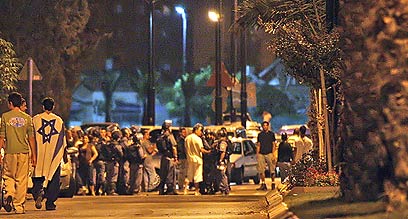
Peres visits Akko, urges side to exercise tolerance
President, chief rabbis visit torn northern city, call on local Jewish, Arab public officials to opt for cautious declarations. Conflicting communities fault each other for allowing extremists to instigate riots. 'Sadly, long time Akko residents are the silent majority,' say City councilman
President Shimon Peres arrived in the northern Israeli city of Akko on Monday, accompanied by Chief Rabbi Yona Metzger and Chief Sephardic Rabbi Shlomo Amar.
The three met with Akko Mayor Shimon Lankry, Akko's Chief Rabbi Yosef Yashar and the head of the city's mosque, Sheik Samir Assi, as well as with MK Abas Zkoor (United Arab List-Ta'al) and Jewish and Arab community leaders, following the recent riots which have plagued Akko's streets.
"Words can be deadly and public figures must be careful about what they say, especially at a time like this," said Peres.
Commenting on the police investigation of the riots, Peres said that "Israel has two religions, but only one rule of law. I'm sure both the Jewish and Arab community leaders would urge their congregations to respect one another."
During the meeting it was decided that a forum of rabbis and sheikhs would be established in Akko to "speak to the younger generation, help calm the situation and monitor the situation on the ground".
Despite several peace initiatives, the Akko riots refuse to die down. City residents, both Jewish and Arab, hold extremist elements to blame for disturbing the once peaceful co-existence.

Peres (M) with chief rabbis, Akko leaders (Photo: George Ginsburg)
According to the Arab residents on the northern city, those responsible have moved to Akko from Gaza and the West Bank; and among them are many hesder yeshiva students, who wish to disrupt the current way of life in the city.
"Even our long time Jewish neighbors, tell us 'you know those responsible are not longtime Akko Jews,'" Akko resident Adal Hobashi told Ynet.
According to Arab residents, the establishment of the hesder yeshiva in the mixed Wolfson neighborhood was detrimental to the status-quo; citing examples the 2006 Simchat Torah riots, which broke out when the yeshiva students tried to circle the neighborhood; or the 2007 Ramadan incident, in which they prevented Muslims clerics form using speakers to announce the fast's end.
Another resident, Khaled Chalifa, mentioned that "it was only during the last few years that this neighborhood got its own community policing station. That tells you how things have changed. I remember going into the homes of my Jewish friends and going into the synagogue, before it turned into the yeshiva. There were no walls between Jews and Arabs them. Today, there are nothing but walls."

Akko Riots (Photo: Shai Vaknin)
Akko as a test case
Out of some 52,000 Akko residents, Arabs claim that only several hundred can be described as "newcomers". City Councilman, Ahmed Ooda, claimed that "we are talking about some 500-600 families, who bring others in, especially from settlements. We have requested that they be removed, no one listened then, and no one is listening now."
"Sadly, long time Akko residents are the silent majority. Many of them talked to me in the last few days, but sadly they don't speak up. I'm calling on them to raise their voice," added Ooda.
The Akko municipality, however, shows different statistics than the ones presented by the Arab residents: According to City Hall, the hesder yeshiva students comprise of people from all over Israel. In addition, there are some 40 national religious families who belong to a group called Ometz ("courage"), a small percentage of them arrived from the west bank, Akko municipality also added that no Gaza evacuees have moved to Akko.

Akko city council member Ahmed Ooda (Photo: George Ginsburg )
Jewish residents of Akko mirror the claims, saying extremist elements have only moved into Akko in recent years from surrounding Arab communities. They are not long-time Akko residents, they said, and so they do not share a relationship of mutual respect with the city's Jews.
Rabbi Joseph Stern, the head of the local hesder yeshiva, said that "the yeshiva was created in order to enrich both Jewish and ideological life in Akko. We are proud of that; however no provocations started here, especially not in the matter of the Wolfson neighborhood, which we have a wonderful relationship with, except those events during Simchat Torah a few years ago.
"We do, of course, believe that our presence here is important. Akko is a test case for all intermixed cities in Israel," he added.
But not all are as cool headed: Extreme-right activist Baruch Marzel, visited Akko following the riots, telling Ynet that he plans on helping local residents setup a "defense organization" for the Jewish population.
"I am sorry that these organizations need to be created in Israel, but it seems that the Jews of Akko feel like they are in the Diaspora," said Marzel. He also called on Jewish residents of the west bank, who were expelled for the duration of the olive harvest, to move to Akko.
Ahiya Raved contributed to this report










